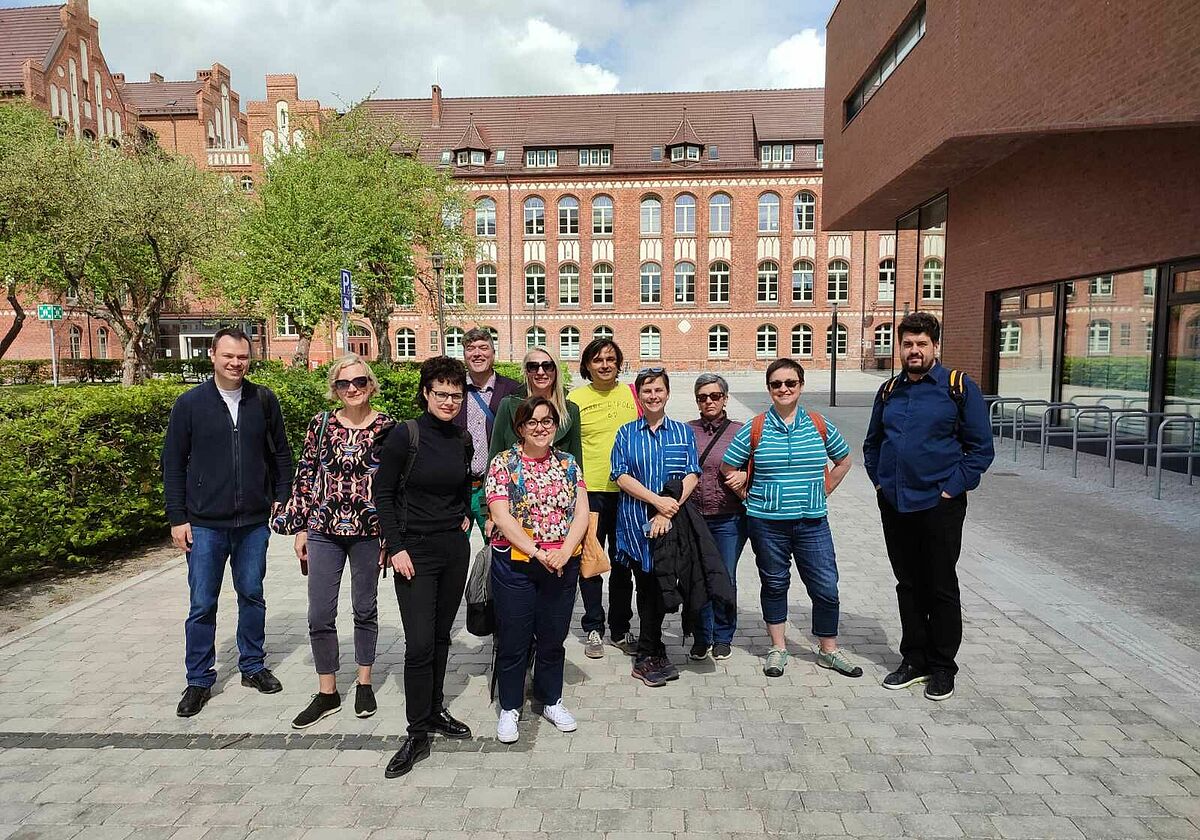(Un)Disciplined: Pluralizing Ukrainian Studies—Understanding the War in Ukraine

(Un)Disciplined: Pluralizing Ukrainian Studies—Understanding the War in Ukraine
The project "(Un)Disciplined: Pluralizing Ukrainian Studies—Understanding the War in Ukraine" is a research network comprising five subprojects, four disciplines, and three locations—the universities of Greifswald, Regensburg, and Giessen. Funded by the German Ministry of Education and Research (BMBF) within the funding line for "small disciplines," it pursues several goals. Thematically, it was designed to understand the "frozen conflict" in Donbas(s), to investigate its long foreplay and cultural dimensions, and most importantly, the impact of the war on Ukrainian society and identity discourses. Methodologically and institutionally, its goals are pluralization, networking, and thus the consolidation of Ukrainian studies in Germany and internationally. Of particular significance for the project's collective are the critical perspectives on the interplay between nation-building and Ukrainian studies and the attempts to "discipline" and instrumentalize them, especially in times of war.
the research focus on the war in Ukraine
Since the full-scale Russian attack on Ukraine and the horrific damage it is inflicting on the country, the research focus on the war in Ukraine has become urgently needed. However, along with the unspeakable suffering and destruction of human lives and infrastructure, the Russian invasion also entails tremendous risks and challenges for the victimized society. The major one is an extreme polarization and affectivization of public and academic discourse that threaten to undermine the very same struggle for democratization and freedom, epitomized in the formula of “European values” Ukrainians are fighting for. Working through the complex entanglement with the former imperial power(s) and raising awareness of the dichotomies of anticolonial or anti-imperial entrapments, we hope to realize the often-claimed Ukrainian subjectivity.
Unequivocally condemning Russian military aggression against Ukraine, we, at the same time, are committed to resisting any “disciplining” of academic discourses within national(ist), anticolonial, neo-imperial, or other authoritarian and essentialist frameworks. Instead, UNDIPUS aims to continue the project of conceptualization of Ukraine’s multi- and transcultural past, present, and future potentials. This, in turn, requires an intense dialogue across disciplines, cultures, and methodologies – Slavic, Jewish, Balkan, and German studies as well as linguistics, literary, historical, memory and area studies, sociology, political and trauma theory, economic history, psychoanalysis, queer and gender studies, and ecocriticism.
Coordinated by
Coordinated by PI PhD Olga Plakhotnik and JProf. Dr. Roman Dubasevych (both Chair for Ukrainian Cultural Studies, University of Greifswald), UNDIPUS seeks to bundle, through a series of academic events —workshops, conferences, and exhibitions—as well as collective publications, the most important research initiatives on Ukraine in Germany to make Ukrainian Studies as a “small discipline” visible and vocal at home and abroad as a separate discipline and as part of East European Studies. In so doing, the UNDIPUS initiative seeks to meet the urgent need for expertise on Ukraine in Germany and thus contribute to more effective peace efforts.
Subproject I (Dr. Olga Plakhotnik, U of Greifswald), titled “Building Nation, Negotiating Identities: Sexual Citizenship on Ukrainian-Russian Borderland,” examines how identities and belongings are negotiated in regional LGBT+ communities on the Ukrainian-Russian borderland in wartime. Using a combination of critical discourse analysis and a decolonial approach, the project seeks to connect borderland as a material-symbolic condition of everyday life and border thinking as a method.
Subproject II (JProf. Dr. Roman Dubasevych, University of Greifswald): Trauma, Heroism, and War. Since 2014 Russian hybrid war against Ukraine has produced a new wave of heroic narratives on both sides of the conflict. Using the concepts of memory, gender studies, and psychoanalytic trauma theory, subproject II puts the current development into the context of the dominant Ukrainian memory paradigm. Against the backdrop of the Cossack myth, “the battle of Kruty,” UPA guerrilla warfare, the victims of the Maidan massacre, and the current war victims, the research explores the interplay between trauma, heroism, and humiliated masculinity, as well as their influence on political imagination and peace process.
Subproject III (PD Dr. Martin Henzelmann, University of Greifswald) is “Tracing Language(s) and Ethnicity in Budzhak.” The linguistic reality in Ukraine is reflected primarily in the competitive use of Ukrainian and Russian. Thus, the members of the numerous linguistic minorities and their needs are rarely considered. This subproject aims to document the perspective of these groups in southern Bessarabia and to highlight their point of view on Kyiv's current language politics.
Subproject IV “After Masculinity. Female Perspectives on the War in Eastern Ukraine” (Dr. Alexander Chertenko, Justus Liebig University Giessen) examines the specific figurations of the feminine in Ukrainian literature by women in the context of the war in the Donbas(s). By this means, it attempts to gain a deeper understanding of the conflict's causes, its interpretations, and cultural repercussions.
Subproject V (Dr. Oleksandr Zabirko and Dr. Alina Strzempa, both University of Regensburg) is titled “Poetics of Industrial Landscape: Donbas(s) and Upper Silesia in Comparative Perspective.” The subproject explores the literary and cinematographic representations of the (post)industrial living environment against the background of global and regional structural changes which affect the old industrial regions. In this regard, the project's main focus is on the discursive potentials of regional spaces and ecocritical thinking, and the relations between borderlands and national centres.
